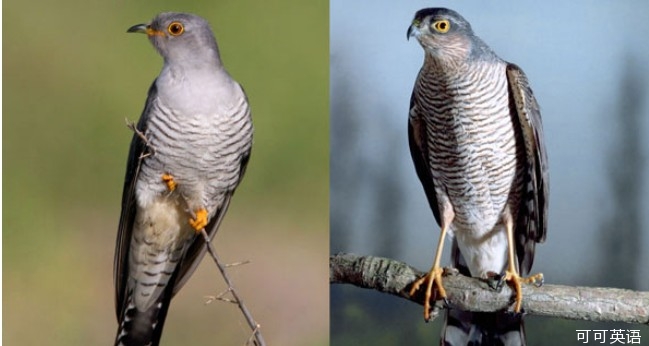
Science and Technology Mimicry The first sparrowhawk of spring
科技 模仿 春天第一只雀鹰
To obtain better access to warbler nests, cuckoos mimic raptors
为了更好地抢占莺的巢穴,杜鹃通常会模仿成猛禽的样子
THE resemblance between cuckoos and sparrowhawks has been a cause of comment since ancient times.
杜鹃和雀鹰之间的相似性自古以来就是引发评论的原因。
As the photographs above show, the two birds (cuckoo on the left, sparrowhawk on the right) are similar in size, shape and plumage, and both have a conspicuous pattern of bars on their breasts—a pattern found on many species of hawk, but not on the cuckoo's relatives.
正如上面的照片显示的两只鸟(左侧的是杜鹃,右侧的是雀鹰),它们在大小,形状和羽毛上都很相似,二者的胸前都有突出的条纹——许多鹰类都有这种类型的条纹,但杜鹃的亲戚中却没有。
Until now, though, no one has thought to take that observation any further, and test whether the one is truly mimicking the other.
虽然现在还没有人对此进行更深入的观察,并证实杜鹃是否真的在模仿对方。
Cuckoos would have good reason to do so, since the warblers and other small birds in whose nests they lay their eggs are understandably frightened of hawks, and give them a wide berth.
杜鹃有很好的理由去模仿鹰,由于莺和其它的小型鸟类在它们的巢中产卵,自然这些小型鸟类就很害怕鹰,并且对鹰敬而远之。
Such leeway would make it easier for a female cuckoo to lay where she chose.
这样的空当就给了雌杜鹃自由选择巢穴产卵的机会。
Nick Davies and Justin Welbergen, a pair of ornithologists at Cambridge University, have now corrected that omission.
尼克?戴维斯(Nick Davies)贾斯汀?韦伯尔根(Justin Welbergen)是剑桥大学的鸟类学专家,它们现在补充了这种遗漏。
They have tested the idea that cuckoos mimic hawks—or, at least, that warblers think cuckoos look hawklike.
它们已经证实了杜鹃会模仿鹰——或者说,至少在莺看来,杜鹃非常像鹰。
As they report in the latest edition of Behavioral Ecology, they have found that it is true, but only up to a point.
就像它们在最新一期的Behavioral Ecology上报道的那样,它们已经发现这是正确的,但至少在某种程度上可以这么讲。
To carry out their test, Dr Davies and Dr Welbergen put stuffed birds near reed-warbler nests, to observe the nestholders' reactions.
为了进行它们的测试,戴维斯博士和韦伯尔根博士将几种鸟类标本放到了莺的芦苇巢附近,用来观察这些巢主人的反应。
They used three species: sparrowhawks (which are a direct threat to a warbler's life), cuckoos (which do not harm adult warblers, but do stop them reproducing successfully) and doves (included as a control, since they pose no threat at all).
他们用了三种鸟类:雀鹰(直接威胁莺生命的猛禽),杜鹃(不会威胁成年莺类,但是会顺利地影响莺类的繁殖),还有鸽子(只是作为一个对照,它们不会对莺类造成任何威胁)。
The breast of each stuffed bird was adorned with a piece of white silk.
每种鸟类的胸前都用一块白色的丝绸装饰。
Some pieces of silk were left plain. Others had bars drawn on them with a felt-tip pen.
一些丝绸偏左放置。其它条纹则用记号笔画制而成。
Once the stuffed birds were in place, the two researchers recorded the reactions of the nestholders.
一旦将这些鸟类标本放置好,这两位研究人员就记录巢主人的反应。
In particular, they measured how closely the nestholders were willing to approach the stuffed intruder, and also how noisily the intruder was mobbed, in an attempt to drive it away.
他们会专门评估这些巢主人对于不速之客的接近程度,以及围攻入侵者并试图将其赶走的激烈场景。
The barring, they found, was crucial.
他们发现了一个非常关键的例外。
Though the warblers could clearly tell the difference between the species (they mobbed the cuckoos most and stayed farthest away from the sparrowhawks),
虽然莺类可以很清楚地分辨出这些鸟类的不同(它们主要围攻杜鹃,最大限度地远离雀鹰),
in the cases of all three types of stuffed bird those decorated with stripes were approached more cautiously and mobbed less than those without stripes.
对于那些装饰了条纹的三种鸟类标本,它们更谨慎地接触,并且围攻那些没有条纹的鸟类。
Hawk-like stripes do, then, provoke what is, from a cuckoo's point of view, the desired reaction: less of the sort of behaviour that is likely to interfere with her egg-laying mission.
从杜鹃的角度来看,鹰状条纹所起的主要作用就是它所希望看到的:如果缺乏这种行为会则会影响到杜鹃的产卵任务。
Not perfect mimicry, but good enough to be useful.
虽然这种模仿不甚高明,但已经足够用了。
Probably, Dr Davies and Dr Welbergen have caught cuckoo and warbler in the middle of an evolutionary arms race.
也许戴维斯博士和韦伯尔根博士已经注意到了杜鹃和莺正处于一个进化的军备竞赛中。
Come back in 10,000 years and cuckoos and sparrowhawks may be indistinguishable.
回到10000年前,杜鹃和雀鹰或许就难以分辨了。












